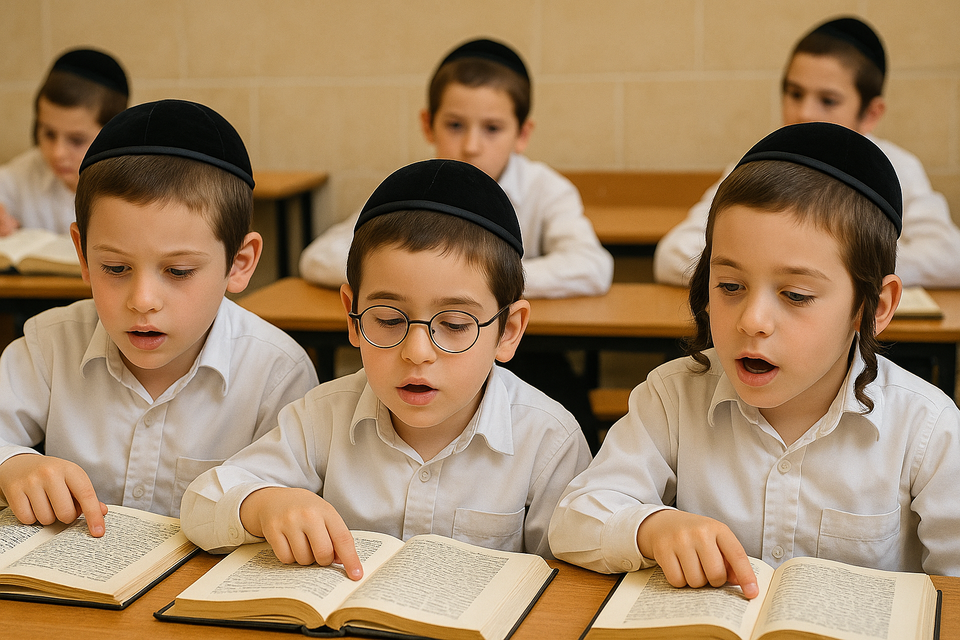Why Do Charedim Avoid Secular Education in Chadarim and Yeshivos?

To understand the Charedi approach to secular education, one must first understand the Charedi worldview: Torah is not just our religion—it is our reality, our wisdom, our national mission, and our eternal heritage. Every moment of limud haTorah is a sacred act, and every distraction from it must be carefully measured against its spiritual cost.
This doesn't mean that Charedim believe secular knowledge has no value. It means that we do not place it on the same level—or even a comparable level—as Torah. And when secular studies are introduced into the core of a child’s chinuch—especially during the formative years—it often displaces Torah learning rather than supporting it.
1. The Core of Chinuch Must Be Kodesh
The Charedi system is designed around Chazal’s model of "Torah tzivah lanu Moshe, morasha kehillas Yaakov" (Devarim 33:4)—Torah is our inheritance and should be transmitted in its purest form. This is especially true for children, whose hearts and minds are still being formed.
Rav Elazar Menachem Man Shach zt”l wrote passionately:
“A pure chinuch must be one in which the child knows from his earliest years that the purpose of life is Torah and mitzvos… When secular subjects are mixed in, the child no longer sees Torah as supreme.”¹
The Steipler Gaon, Rav Yaakov Yisrael Kanievsky zt”l, warned that:
“Secular studies in yeshivos harm not just the time taken from Torah, but the entire atmosphere of the yeshiva. They bring in foreign values, comparisons, and a weakening of yiras Shamayim.”²
2. Secular Knowledge Is Not Neutral
Charedim do not merely oppose content that is heretical or immodest. They oppose a worldview that sees Torah as one “discipline” among many. Much of secular education—even in math, literature, history, and science—carries with it assumptions and philosophies that conflict with Torah hashkafah.
Chacham Ovadia Yosef zt”l once said in a public shiur:
“We are not against knowledge. We are against educating our children in a framework that will turn their hearts away from Hashem.”³
And Rav Aharon Leib Shteinman zt”l wrote:
“To think that a little bit of kefirah won’t hurt—this is the yetzer hara’s oldest trick. The poison isn’t always in the words. Sometimes it’s in the tone. Sometimes it’s in the comparison.”⁴
3. Secular Education Has Historically Been a Trojan Horse
From the Haskalah movement until today, “enlightenment” has often come wrapped in curriculum. The Charedi world learned—painfully—that once Torah education is diluted, assimilation soon follows.
The Chazon Ish zt”l ruled unequivocally:
“Any attempt to create a joint curriculum of Torah and secular studies will, in the end, degrade Torah in the eyes of the student.”⁵
This is why Charedi gedolim have insisted on keeping Torah education completely separate. Not because Charedim are “anti-education,” but because we’ve seen what happens when the walls of kedushah are lowered.
4. We Educate for Olam HaBa, Not Just Olam HaZeh
In secular society, education is primarily a tool for success in this world—careers, prestige, wealth. But Torah education is a path to eternity. Charedi education is built not to fit into society but to elevate it.
Rav Moshe Feinstein zt”l explained:
“A child who is raised to believe that his goal is parnassah will never understand what it means to live for Hashem. We must raise our children to be ovdei Hashem. Parnassah will come when needed, but it is not the ikkar.”⁶
This is why many Charedim willingly forgo opportunities that others consider vital: academic degrees, top-tier careers, or cultural literacy. We believe Hashem is the One who provides parnassah—and our job is to build ehrliche Yidden.
5. But What About Basic Literacy and Math?
Many Charedi institutions, especially for younger children and girls, do include some secular studies—reading, writing, arithmetic, and language. But these are usually limited, monitored, and always secondary to Torah learning.
For boys, especially in the yeshiva system, the emphasis remains exclusively on Torah. Rav Michel Yehuda Lefkowitz zt”l said:
“Torah has its own light. If you believe in that light, you won’t need to ‘supplement’ it with anything else during the years when the soul is being formed.”⁷
Conclusion: Not Isolation—Protection
The Charedi world doesn’t fear knowledge. It fears the erosion of the soul. Secular education, in and of itself, is not a threat—but in the hands of a secular state or culture, it often becomes one.
And so we protect our children—not with arrogance or backwardness, but with the conviction that Torah is life, and that chinuch must reflect our deepest truths.
Sources & Footnotes
- Rav Elazar Menachem Shach, Michtavim u'Maamarim, Vol. 1, Letter 3
- The Steipler Gaon, Karyana D’Iggarta, Vol. 2, Letter 365
- Chacham Ovadia Yosef, Yechaveh Daas 5:58, public shiur in 1990s
- Rav Aharon Leib Shteinman, Ayeles HaShachar on Chumash, Parshas Yisro
- Chazon Ish, Letters, Vol. 1, Letter 18
- Rav Moshe Feinstein, Igros Moshe, Yoreh De’ah 4:36
- Rav Michel Yehuda Lefkowitz, quoted in Mevaser Tov, 2003 interview
